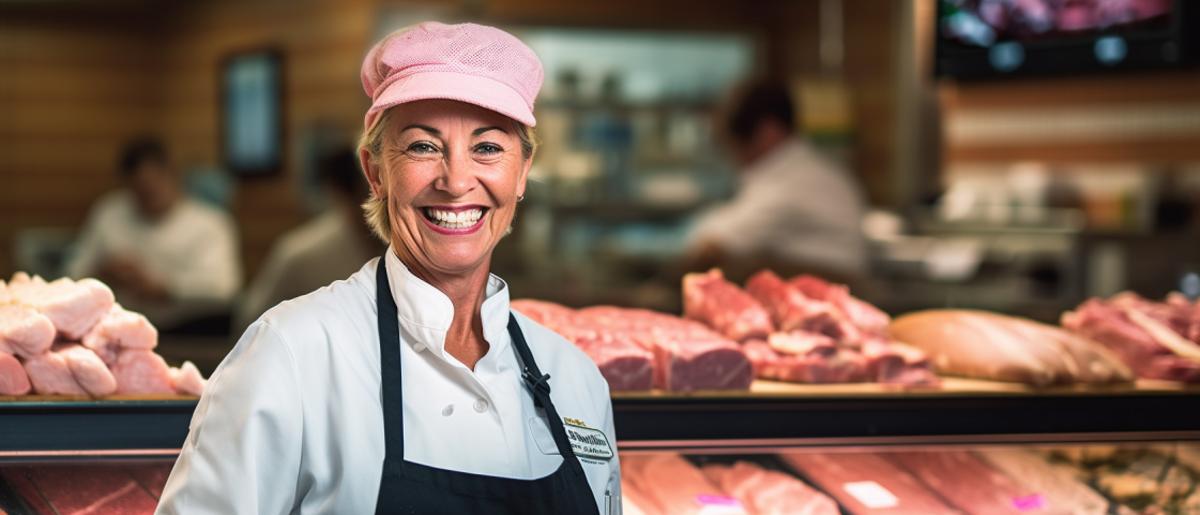

In the bustling industry of meat retail in Australia, ensuring consistent cash flow to meet demands is a blend of art and science. Sourcing high-quality produce, maintaining optimal storage conditions, handling customer requests, all while also staying competitive, could stretch even the most professional meat retail businesses. Here's where a robust financial strategy becomes indispensable, and business loans could play a key role. They aren't just a lifeline during financial constraints; they are the power source for growth and innovation. If you're a meat retailer, business loans can fund new equipment purchases, help with the remodelling of your store, assist in covering wages during peak season, and even facilitate an overall expansion of your business. Indeed, for many meat retailers across Australia, these loans have proven to be a crucial tool for business development and stability. So, let's delve into the world of business loans and explore how they can boost your meat retail business in the competitive Australian marketplace.
Compare over 40+ lenders with one application.
Meat Retailers form a crucial component of the Australian food industry and economy. As purveyors of prime cuts, fresh produce and locally sourced goods, they play an indispensable role in connecting the country's thriving livestock sector with the tables of households across the nation. The relationship between meat retailers and their suppliers is a symbiotic one. It ensures that superior quality, wholesome meat reaches consumers with optimum freshness while supporting livestock farmers by providing a steady demand for their produce. This cycle of demand and supply contributes to the robustness of the agricultural sector and, in turn, strengthens the overall economic health of Australia. Aside from their localised economic impact, meat retailers also help maintain dietary diversity within communities by giving consumers a broad choice between beef, lamb, kangaroo and more. They uphold the country's gastronomic traditions and fuel culinary creativity by provisioning not only mainstream cuts but also unique, offbeat offerings. In urban regions, these retailers work as lively junctions between the rural outback and city dwellers, offering a slice of the countryside within the city's bustling spaces. For regional and remote towns, meat retailers often serve as a social hub, a familiar fixture promoting a strong sense of community. Ultimately, the importance of Meat Retailers in Australia extends well beyond their commercial purpose. They are anchoring posts in our local economies, gateways to gastronomic adventures, and crucial threads in the social fabric of our communities.
Learn about eligibility and how to apply.
As part of a demanding industry, meat retailers across Australia grapple with a range of challenges on a daily basis. The retail landscape in Australia has always been dynamic, but meat retailers face a unique set of hurdles. One significant challenge is the price volatility of livestock. This unpredictability makes it difficult for meat retailers to plan in advance, often leading to unexpected costs which can threaten stability. Staying competitive in an economy where big supermarket chains dictate prices and dominate is often tough for the smaller retailers. Additionally, there is a rising demand for ethically-produced and high-quality meats. Consumers are increasingly conscious of how their food is sourced. They are often willing to pay premium prices for ethically-reared produce, placing added pressure on meat retailers to source high-quality products from trustworthy suppliers - a task that can be both time-consuming and financially demanding. It doesn't stop there. Australian meat retailers also have to navigate stringent food safety regulations. Compliance with these norms requires conscious effort, adding a layer of administrative complexity that can divert focus from the core business. Not to mention, overheads such as utilities, staff wages and rent are inevitable yet burdensome costs, especially for retailers in high-street locations. While these challenges can seem daunting, the right financial support can go a long way in assisting meat retailers to run their businesses successfully. Such barriers clearly spotlight the need for viable financing solutions, such as business loans, in order to navigate these obstacles and achieve growth in the competitive meat retail industry.
Calculate your repayment estimates and more.
In an ever-changing market, the capacity to adapt and react promptly is pivotal for thriving meat retailers in Australia. A business loan, in this context, can be a game-changer, providing the monetary support necessary to counteract challenges and seize opportunities. It offers a financial buffer to mitigate unpredicted market fluctuations, unforeseen expenses, or sudden stock shortages, thus providing the peace of mind and the financial ease to make agile and beneficial business decisions. Additionally, a business loan can stimulate business expansion and modernisation. It empowers meat retailers to invest in the latest technology and high-grade equipment that can enhance operational efficiency, reduce wastage, and improve product quality. From financing refrigerated displays and storage facilities that retain product freshness to the most current digital payment systems that elevate customer experience, a business loan could be the stepping stone to a more contemporary, efficient, and lucrative business. Lastly, business loans can aid in maintaining a stabile cash flow. Salaries, utilities, rent, suppliers' payments are predictable outlays that need to be settled irrespective of the sales volume. A business loan can address these cash flow inconsistencies, ensuring these crucial aspects run smoothly. Thus, a business loan to meat retailers is more than a financial boost, it is a tool that brings stability, stimulates growth and modernisation and buffers the make-or-break vagaries of the market.
For Aussie meat retailers seeking financial backing, several favourable business loan options abound. A flexible line of credit can finance regular operational costs, while term loans are ideal for large purchases or expansions. Further, invoice financing solutions can iron out fluctuations in cash flow by leveraging unpaid invoices.
There are several types of business loans in Australia that can benefit Meat Retailers. Each of these loan types has its unique features, advantages, and potential disadvantages. Here are some of the most common types of business loans for Meat Retailers:
Term Loans
Term loans are a stable source of finance and can be used to cover various business needs such as refurbishing your store, purchasing new industry-specific equipment, or expanding your business. They come with a fixed interest rate and a defined payment time period.
Purchase Order Financing
This loan type is perfect for meat retailers who struggle with managing the cash flow between fulfiling large orders and getting paid by the customers. A financial institution pays the supplier on behalf of the retailer, then the retailer repays the institution once the customer has paid for their order.
Equipment Loans
Equipment loans are designed to help businesses with the purchase of essential business equipment. For meat retailers, this could be anything from new fridges to high-tech cutting machines.
Invoice Financing
If your customers take a long time to pay their invoices, you may benefit from invoice financing. In this arrangement, a lender provides you with a loan amount that matches the unpaid invoices, offering you improved cash flow.
Line of Credit
A line of credit is a flexible loan that provides you with a maximum credit limit, which you can access as needed. This is particularly useful for managing cash flow and unexpected expenses in your meat retailing business.
Overdraft Services
Overdraft services enable you to withdraw money beyond your account limit. Overdrafts can cover unexpected shortfalls in your cash flow, especially useful for managing inventory costs in the meat retail business.
Cash Flow Loans
Cash flow loans are quick-fix solutions to cover immediate operational costs, which can be very helpful for meat retailers given the high daily overhead expenses of running a meat shop.
Merchant Cash Advances
A merchant cash advance is an advance sum you receive in return for a slice of your future sales. This type of financing is suitable for meat retailers with high debit or credit card sales.
Inventory Loans
Inventory loans are used for purchasing inventory during high-demand periods. As a meat retailer, it can help you meet increased demand during festive or holiday seasons.
Working Capital Loans
Working capital loans provide the necessary funds to cover day-to-day business operations. Retail meat dealers can use it to ensure smooth business operations during lean periods or to cover various routine business expenses.
Business loans for meat retailers in Australia serve manifold purposes. They work as a booster in purchasing advanced equipment, extending inventory to include niche or gourmet products, and expediting expansion into new markets. Providing financial flexibility, these loans aid in overcoming the market's unpredictable challenges.
Here are some common reasons Meat Retailers use business loans:
Equipment Upgrade
Business loans often enable Meat Retailers to finance the purchase of new, more efficient equipment. Modern technology can significantly improve meat processing, storage, packaging, as well as overall operational efficiency.
Expansion of Retail Space
Retailors can use the funds to expand their physical store, providing more variety and increasing capacity. This can also involve creating a more appealing store layout to improve customer experience.
Working Capital
Cash flow is crucial for the day-to-day operations of meat retailers. Business loans can provide the essential working capital needed for inventory purchases, wages, and other recurring expenses.
Starting Online Sales
The loan provides a financial boost to initiate or expand online sales. This can include website development and inventory management system upgrades to cater to online orders.
Refrigeration and Storage
Investment in advanced refrigeration and storage systems is vital for meat retailers. High-quality systems ensure the freshness of the meat products, enhancing customer satisfaction.
Marketing & Advertisements
With more capital available from a loan, meat retailers can amplify their marketing efforts to reach a wider audience, driving sales and brand recognition.
New Outlets
The loan might facilitate the launching of new outlets, helping meat retailers extend their reach in different geographic areas, thereby growing the business.
Employee Training
Loans can be utilised to invest in staff development. Having skilled butchers and well-trained staff ensure quality products and excellent service.
Supply Chain Enhancement
Business loans may be directed towards strengthening the supply chain. This could be by securing deals with premium suppliers or investing in technology to streamline inventory management.
Renovation and Maintenance
Outstanding loans can be spent on maintaining and renovating existing stores. A pleasant shopping atmosphere can attract more customers and enhance brand image.
To estimate your monthly repayments and the total cost of the loan, input the loan amount, loan term and interest rate into the calculator below. This helps you plan your budget and choose the most suitable loan terms.
These helpful FAQs will help you find the answers you need. If you can't find what you're looking for, you can request a callback below.